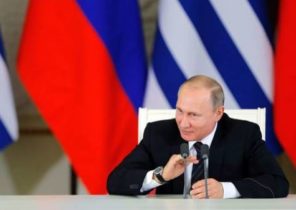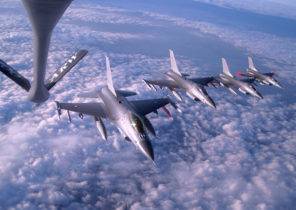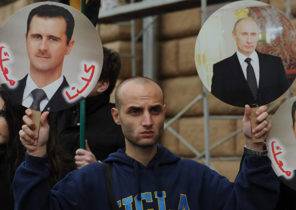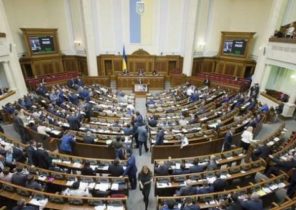
Two centuries ago to get from the Baltic sea to the Adriatic through the Black it was necessary to cross the territory of only two countries: the Russian and Ottoman empires. Today, 60 years after the signing of the Treaty of Rome a quarter of a century after the fall of the iron curtain, you have to go through a dozen countries on the way from Tallinn (Estonia) to Trieste (Italy) to Odessa (Ukraine). A dozen of the now-independent States, whose fate is still being resolved in other capitals yesterday in St.-Petersburg and Constantinople, today in Moscow, Brussels, Washington and Ankara. I decided to go for these countries to understand their cooling towards Europe and a new attraction to Russia.
Poland — Russia is still the enemy
In the bus on the way from Berlin to the Polish Wroclaw next to me sits a 32-year-old Cameroonian Reagan. He couldn’t get a visa to finish the training for the degree of master of chemistry in France, and in Germany it is also not accepted. At the same time, Poland opened its doors offering the opportunity to study and work. Now Reagan is working at the Polish office of the international company, where he was taken in the French support. He earns about 800 euros a month and no complains about life. Indeed, in contrast to Ukraine, appeared on the younger brother he was able to “get into Schengen”. Reagan left his wife at home and children, but very happy with the classes in English and hopes to try his luck in Canada or Germany after graduation in Poland.
Until recently, Poland was the center of emigration, but now gradually she starts to accept immigrants. In particular there are becoming more and more Ukrainians. At some universities, they occupy half the lecture halls.
Russia remains an enemy. In Wroclaw I see bouquets of flowers at the foot of the huge pedestal of grey stone, the Central part of which begins to crack under the weight of huge Catholic cross. This monument was erected in 2000 “deported to Siberia and their fellow citizens in memory of all the exiles and victims, as a warning for future generations and a sign of gratitude to God for the return of the inhuman country: Soviet hell”. For the Germans here, too, looking with distrust. On the facade of the German Consulate in Krakow to hang a banner in honor of “25 years of good neighborly relations” between the two countries. As in the Baltic States, Ukraine, Romania and Hungary, all the “bloody lands” described by historian Timothy Snyder (Timothy Snyder), hostility to Germany is still on a subconscious level. “Good neighbors” but not “friends”.
The scars of war heal more slowly that only a few States do conduct historical work with the past. Relations remain uneasy with all the neighbors, not only with Germany and Russia. Lithuanians have not forgotten the Polish occupation of 1920, the poles recall Ukrainians persecution during the Second world war, Ukrainians are angry at the Romanians for their support of the Nazis, etc.
In 2010 in Wroclaw was reopened synagogue. 57-year-old Israeli went there with my elderly mother. “We lived in the courtyard of the synagogue, but left 50 years ago,” she says. She first returned to their homes. After 1945, 100 of thousands of surviving Holocaust victims were temporarily placed in Wroclaw. They were too weak or too badly injured to return. Today the community comprises a total of 327 people.
In Krakow, the Jewish quarter, on the contrary became fashionable, and now there go the tourists. The Jewish community re-organize large holidays. There you can meet the Germans in the tourist compounds that affects the virtuosity of local street musicians. And just a few kilometres away, tourists take selfies in front of the entrance to the crematorium of Auschwitz.
“A Ukrainian worker cheaper than the Chinese”
The road from Poland to Ukraine is three hours. “The way can take anywhere from 2 to 11 hours,” says the driver. People walk around the bus to stretch my legs, and tongues untied. Anastasia (“and the Russian and Ukrainian name,” as she says) goes to his parents in Mariupol in Eastern Ukraine. The road will take her two days. Before the war in the Donbass in 2014, she went to study in Polish Katowice. She speaks Russian and Ukrainian, started to learn Polish and does not exclude that will live in Poland.
One Ukrainian describes his life: “I am 29 years old. I was born in USSR, live in Ukraine, went through two revolutions and hyperinflation. What else can happen?” In search of stability, the engineer went to work on the farm in Denmark. He praises the serious approach of the Danes, but after five months there, he began to miss the countrymen with all their faults. So he went back and got a job in the company-subcontractor of Google. He earns a thousand euros a month and believes that he was lucky. “I saw a study a car company: a Ukrainian worker is now cheaper than the Chinese. $ 250 per month first 300 second”. Like the other two that I’ve met then Ukrainian, he utters these words: “I am optimistic about the future of the country, but I don’t think I have seen it in life.”
Arriving in Lviv, a large city in the East of Ukraine, it is impossible to imagine that in a country at war. 24 Aug terrace cafés Packed with people and tourists from Europe, Turkey and Middle East watch performances of folklore groups on the occasion of the national holiday. I can not see any policeman or soldier. In this magnificent city, which was first Polish, then Austrian, Polish, Soviet and finally Ukrainian, persistence of power is perceived in a relative light.
Raging in the East the conflict (it is separated by more than a thousand kilometers) spared not the lions. City cemetery (400 thousand graves on the 40 acres) symbolizes the tragedy of the region. There are Ukrainians, Germans, poles and even the French. The horrors continue. Now dozens of parents and widows sitting by the remains of those killed at the front, sons and husbands. The earth is still loose, and the gravestones did not have time to deliver. The plot for “patriots” is seen about fifty crosses with the photos (often very young) dead. Marked next to three empty squares. For future “heroes”.
Although Odessa is much closer to the Crimea and Donbass, the war there is even less than in Lviv. Probably because this was founded by Catherine II the city was nearly sends volunteers to the front. Residents do not support Putin, but they speak Russian and are looking at Kiev with mistrust. This charming black sea port town “writers” (the local version) or “lazy” (according to Kiev) people primarily consider themselves Odessites. They are pushing the quality of life and a great understanding of all religious communities. Unless the synagogue is not just a couple of streets away from the mosque? At the same time, they don’t like to talk about the incredible number of large sedans with tinted Windows, which raise some doubts about the integrity of the local elite.
According to Anna, the corruption will only get worse after 2014, and the revolution on the Maidan. It should be noted that this employee of the bookstore adheres to the openly Pro-Russian positions. “It’s my language. Here it is spoken. But if I go to Lviv, look askance at me when I speak Russian. Most likely, I’ll go. Perhaps in India. There is in every state speak their language, and it poses no problems. In Canada and Switzerland also take multiple languages. Why is this not in Ukraine? Why the people in Western Ukraine hate us?”
After hearing this, Alexander does not stand up: “This is all nonsense. In Lviv people help us when we are trying to find the words in Ukrainian.” This cheerful and active girl, a specialist in French language, I decided to learn German to work on the Greek cruise liners and travel. “If Ukraine joined Europe, at least I no longer needed a visa for travel,” she sighs.
However, being against Putin does not mean to be for Europe. Owner rented me the apartment Christina is a living example. She was married to a Briton, calls himself a “patriot” and hates Putin, but doesn’t want Ukraine to join the European Union. “Europe does not protect us. Moreover, we have never been so free as now. If we become Europeans in our markets will no longer all these wonderful fresh products. The only thing that could give us a Europe — justice. Your vessels may be to believe, our not.” This educated and intelligent woman is convinced that Europe is on its last legs. “You know that Merkel and Putin are familiar with the times of the GDR? He wants to destroy Europe from the outside, she is inside. For this purpose she launched all of these refugees”. Talk about the famous Odessa multiculturalism did not prevent her sympathetic glances at me when I explain to her that we should not confuse refugees with terrorists. I must say that this scepticism is manifest in almost all of my European interlocutors, with whom I raise this topic…







